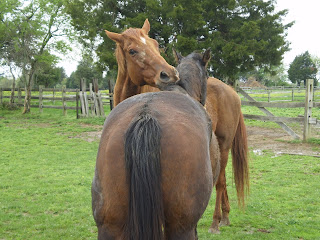There are many times that these techniques work out however: setting boundaries, using body language, sharing power, understanding “herd” dynamics. And there are other times that the system of humanity requires a different approach. For example, I cannot halter a human.Things would be so much simpler if I could.... so little communication occurs when the other person is not present. The other day I had a very frustrating and ridiculous display of dominance from my girls. They refused to do anything all day, which resulted in an almost comical standoff situation in the field. Girls on one hill, staff on the other. If staff made a move, the girls would run.
This situation required some leadership, but everyone was out of ideas. I knew what I would do if they were horses, but I could not do it alone, and I could not seem to communicate it to the other staff in an effective way. So I eventually just started with another staff member walking in an arch towards them. You could see the look on their faces, not quite sure whether to run or stay, and if they were to run, which direction to go in. The result was a scatter in their group, allowing us to get some of the troublemakers separated from the rest. My purpose was not necessarily to “capture” them, but rather to have them see that I had some type of plan, and that if they foiled me, I would not be frustrated.
I have been noticing things about leadership lately, especially when it comes to horses. Lead horses in a herd are most often mares, these horses are most alert to danger, responsible for finding food and safety, and are, as a result the most honored and respected members of the herd. LEAD horses, however, are different from DOMINANT horses. Dominant horses are responsible for creating the hierarchy in the herd. These horses are pushy, get in fights, and are always looking for an opportunity to make a case for their place in the herd. In observing a herd of horses, as we do with people, we often can mistake dominance for leadership.
Lead horses, though they are the most alert ( and may even appear spooky), are full of self confidence. The lead mare goes out first in the group, searches the way, and her herd mates follow her unquestioningly. They trust her to know when to run and when to relax. We look for confidence in our leaders as well, and can always tell the difference between true self-confidence, which is a quiet truth, and a self-proclaiming confidence, that in its obesity loses its value.
Lead horses are not fighters. By that I do not mean that they never have an “altercation” with another horse, but that their communication is typically clear, free from emotion, and physical contact is typically a last resort. Leaders usually use more psychology than force. I have wondered many times why my horse might be refusing to take a step in a particular direction, and then realized that his herd leader was giving him the “look” from about fifty yards away. Leaders cannot waste their time and energy on petty arguments.
One of the most interesting qualities of a lead horse is the ability to remain forever hopeful. Survival in the wild is full of twists and turns, and flexibility and the ability to reroute a plan is of utmost importance. Horses live in the moment and this is not too hard for them. Human leaders often find having an attitude of endless opportunity more difficult. However, it can show up in the simplest forms such as taking a suggestion from an employee or persisting in finding a way to fund a program. Leaders need to have the ability to keep their herd alive, no matter what obstacles crop up.
Though it would be nice if people were more like horses, it’s probably more helpful for me to wish I were more like a lead horse. In trying to be a leader for both my horses and my clients, it can be an overwhelming task. There is another aspect of leadership that I was reminded of that day with the girls; that leadership happens in the moment. A lead horse does not maintain her status of lead horse if she falls down on her responsibilities. Just like horses, people are looking for a leader in every moment. Though it may seem overwhelming, it really makes it simpler. You can be a leader in this moment. You can make the choice to approach the situation with leadership instead of dominance, in this moment. A little bit of leadership right now can truly change the course of things. Each moment holds endless opportunity for the future, if we chose to see it that way.
 |
| A good leader |








